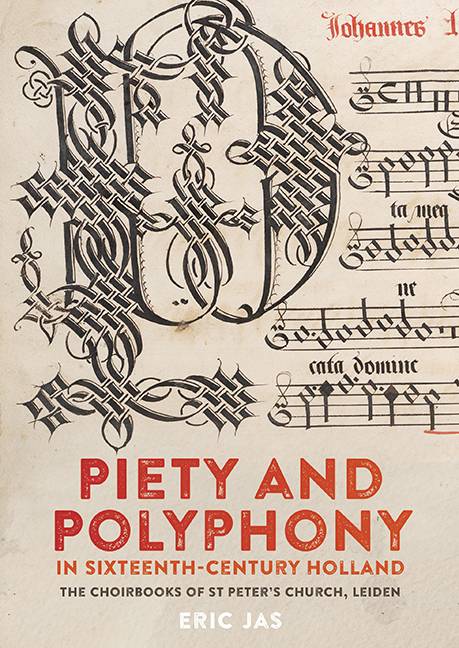Book contents
- Frontmatter
- Contents
- List of Illustrations
- Preface and Acknowledgements
- List of Abbreviations
- Introduction
- 1 The Zeven-Getijdencolleges
- 2 The Seven Hours in St Peter's Church at Leiden
- 3 The Choirbooks of St Peter's Church
- 4 The Repertoire of the Choirbooks
- Epilogue
- Appendix 1 Archival Documents
- Appendix 2 Descriptions and Inventories of the Choirbooks
- Appendix 3 Watermarks
- Alphabetical List of Compositions
- Alphabetical List of Composers
- Concordant Manuscripts and Printed Editions
- Bibliography
- Index
- Studies in Medieval and Renaissance Music
4 - The Repertoire of the Choirbooks
Published online by Cambridge University Press: 17 October 2019
- Frontmatter
- Contents
- List of Illustrations
- Preface and Acknowledgements
- List of Abbreviations
- Introduction
- 1 The Zeven-Getijdencolleges
- 2 The Seven Hours in St Peter's Church at Leiden
- 3 The Choirbooks of St Peter's Church
- 4 The Repertoire of the Choirbooks
- Epilogue
- Appendix 1 Archival Documents
- Appendix 2 Descriptions and Inventories of the Choirbooks
- Appendix 3 Watermarks
- Alphabetical List of Compositions
- Alphabetical List of Composers
- Concordant Manuscripts and Printed Editions
- Bibliography
- Index
- Studies in Medieval and Renaissance Music
Summary
THE six choirbooks of the getijdencollege contain a rich and mixed repertoire of polyphonic sacred compositions. Taken together, the books contain 328 different compositions, some of which are found in two of the manuscripts. Among these works one finds both fragmentary compositions and short hymn settings, and large-scale motets and masses. If the number of contemporaneous manuscript witnesses may be taken as an indication of a work's popularity, then some of the most beloved compositions of the mid-sixteenth century are found in the Leiden repertoire. A rare, impressive, case is Clemens non Papa's motet Maria Magdalena, which is found in two of the Leiden books (1439: 20; 1442: 50) and in no fewer than forty- one other sources. Among the compositions with fewer, but still more than thirty, witnesses are Josquin's Preter rerum seriem (1440: 29; 1442: 48), Benedicta es celorum regina (1439: 25) and Stabat mater (1440: 30; 1442: 32), and Richafort's Iherusalem luge (1442: 51). These motets are closely followed by compositions that are spread over Europe in more than twenty sources. These numbers already indicate that the Leiden singers had at their disposal pieces with a truly international tradition.
At the other end of the spectrum are those pieces that are found only in the Leiden manuscripts and are unknown from any other source. Among these unique copies one finds not only anonymous works and pieces by relatively unknown regional composers, such as Eustacius Barbion, Joachimus de Monte, Claudius Potoletus, Michiel Smeekers and Franciscus Ysenbaert, but also masses, motets and Magnificat settings by Benedictus Appenzeller, Cornelius Canis, Jacobus Clemens non Papa, Thomas Crecquillon, Nicolas Gombert and Jean Mouton. Of particular note among these works are a complete cycle of Magnificats by Clemens non Papa, eight motets by Crecquillon, and the Missa Faulte dargent and two Magnificats by Mouton. Among the anonymous unique works there are also remarkable items, such as the only complete cycle of Nunc dimittis settings that is found in Renaissance music.
THE COMPOSERS
Table 6 lists all the composers who are represented in the Leiden choirbooks. Leaving the sixty-two works that Flamingus added to the books in 1565–1567 out of consideration, it is clear that the core repertoire of the singers of the getijdencollege was formed of masses, motets and Magnificats by Clemens non papa and Crecquillon.
- Type
- Chapter
- Information
- Piety and Polyphony in Sixteenth-Century HollandThe Choirbooks of St Peter's Church, Leiden, pp. 142 - 195Publisher: Boydell & BrewerPrint publication year: 2018



